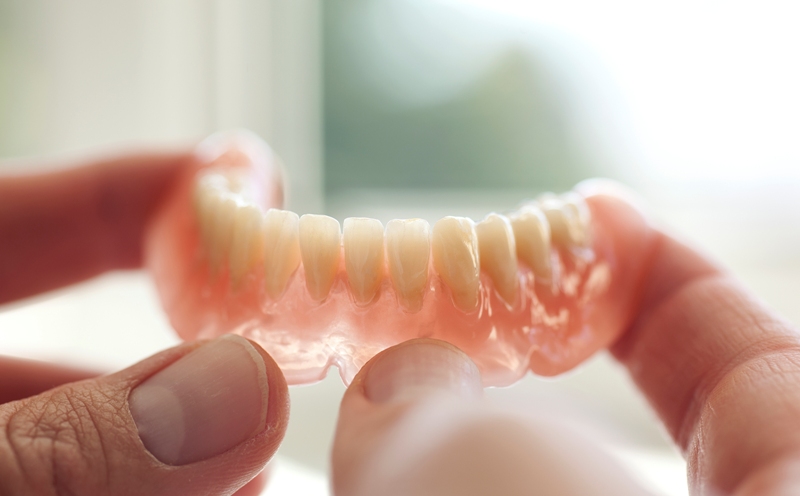Some of our patients who have been wearing dentures for many years are familiar with porcelain denture teeth.
Porcelain has a reputation as a durable material for denture teeth. It resists wear, thus preserving tooth length for a longer period compared to acrylic teeth. Porcelain’s translucency, depth of colour, and reflection of light have also long been considered the gold standard of artificial teeth.
In comparison, acrylic is a softer material than porcelain. As a result, acrylic teeth are more susceptible to abrasion and will wear down with time, causing changes in the length of the teeth and eventually affecting denture function.
So why don’t many Denturists use porcelain teeth anymore?
Strength is a double-edged sword
Because of its durability, porcelain causes excessive wear on natural and acrylic teeth. Acrylic teeth are a better choice than porcelain if your denture will oppose any natural teeth or another denture.
Porcelain also transfers chewing force to the bones of your jaw with greater intensity than acrylic teeth do. The pressures caused by grinding, clenching, or tapping teeth also cause greater force on your jaw when using porcelain teeth. In both cases, the normal rate of bone loss associated with a lack of dentition may be accelerated by these additional forces.
As well, patients often relate that porcelain teeth are “noisy,” or that they can hear clicking sounds when they eat. These sounds are the result of the porcelain teeth coming into contact with each other while chewing. In comparison, acrylic dentures are quieter and feel more similar to natural teeth when eating.
Physical vs. chemical bonds
Another downside to porcelain teeth is that they must be attached mechanically to a denture. This attachment is achieved through the use of small holes or pins on the back of each tooth that enable mechanical bonding to the denture base.
Acrylic teeth, however, are made from essentially the same material as the denture base, which is also acrylic. This means that the bond between tooth and denture base is chemical in nature.
The mechanical bond between porcelain teeth and denture base is not as strong as the chemical bond between acrylic teeth and denture base. As a result, porcelain teeth have been shown to fracture off of a denture at a higher rate than acrylic teeth.
On-par aesthetics
Finally, the appearance of acrylic teeth has come a long way since they were first used in denture construction. Today’s acrylic teeth are lifelike and come in a variety of sizes, shapes, colors, translucencies, and dimensions that can suit any smile.
Just as with nearly any product, there are standard and premium acrylic tooth options. For the most attractive, lifelike, and individualized results, talk to your Denturist about premium acrylic teeth. They offer wear resistance far superior to standard acrylic denture teeth. As well, they are extremely natural looking, refracting light like natural tooth enamel and featuring tooth shapes modeled on natural teeth.
Acrylic has the advantage
In the end, acrylic teeth are healthier than porcelain for most patients, they feel more natural, they have similarly natural aesthetics, and they provide a much stronger bond to the denture base.
While it is true that acrylic teeth will wear down in time, most patients will not experience an issue with tooth wear that would not be addressed through annual checkups and routine denture replacements. The conditions of your mouth will change over time and because dentures do not adapt to this change, the average lifespan of any denture is between five and seven years. This means that acrylic teeth are definitely a durable choice for a denture’s normal lifespan.
If you have previously worn a denture with porcelain teeth and are still not convinced that acrylic is the way to go, your Denturist would be happy to talk with you about how to proceed with your next smile upgrade.

